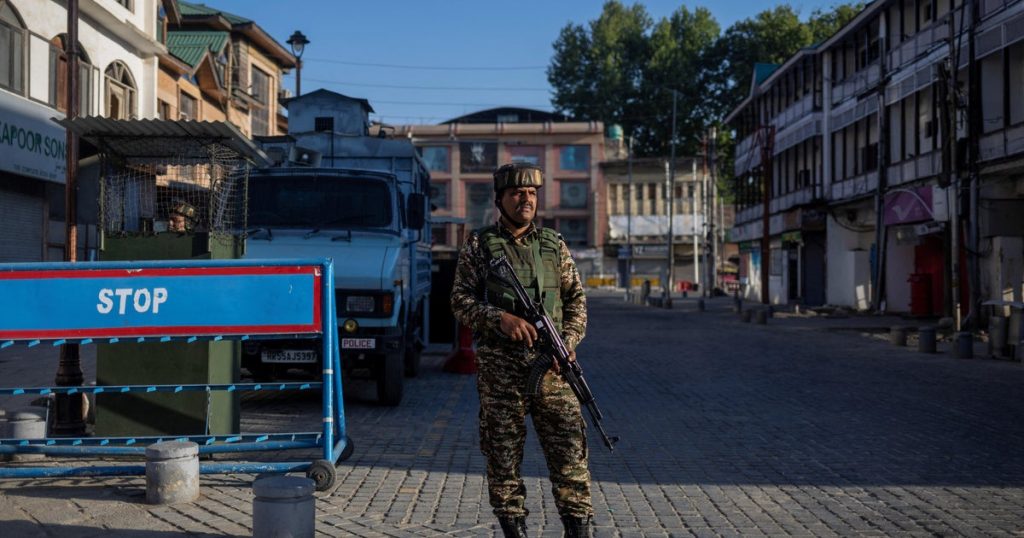A recent terrorist attack in Indian-controlled Kashmir has led to heightened tensions between India and Pakistan, raising fears of military conflict between the nuclear-armed neighbors. Following the attack, which left 26 people dead, including 25 tourists, both nations have accused each other of escalating hostilities. The situation remains precarious as both sides prepare their military responses while international officials express deep concern about the possible consequences of a confrontation.
| Article Subheadings |
|---|
| 1) Background of the Attack |
| 2) Accusations and Claims |
| 3) Military Responses Prepared |
| 4) International Concern and Warnings |
| 5) The Road Ahead |
Background of the Attack
On April 22, 2025, a terrorist attack unfolded in the scenic Pahalgam area of Indian-controlled Kashmir, tragically claiming the lives of 26 individuals, with a significant number being tourists. The incident was attributed to an armed group calling itself the Kashmir Resistance, although there has not been any independent verification of this claim made on social media. This attack is part of a long history of violence in the region, particularly since an armed anti-Indian insurgency ignited in 1989.
Accusations and Claims
In the aftermath of the attack, the Indian government swiftly accused Pakistan of being complicit in the violence, citing intelligence reports linking Pakistani-backed militants to the incident. In response, Pakistan vehemently denied any involvement. The Pakistani Information Minister, Attaullah Tarar, highlighted that the country had “credible intelligence” suggesting that India might retaliate militarily based on what he described as fabricated claims against Pakistan, specifically concerning the Pahalgam incident.
Military Responses Prepared
On the Indian side, Prime Minister Narendra Modi convened a meeting with senior military and government officials, granting the armed forces full operational freedom regarding their response. This suggests that India may be contemplating a significant military operation against perceived threats from Pakistan. Following the attack, India also took non-military measures such as downgrading diplomatic relations and halting a vital water-sharing agreement. Pakistan reciprocated with similar actions shortly thereafter.
International Concern and Warnings
Global leaders and organizations have begun voicing concerns regarding the potential for a military conflict between India and Pakistan. The United Nations issued a warning of “catastrophic” consequences should the two nations engage in warfare. U.N. Secretary-General Antonio Guterres held discussions with both Indian and Pakistani leaders, emphasizing the dire implications of an armed confrontation. In addition, U.S. Secretary of State Marco Rubio called on both countries to defuse tensions and prevent escalation, signaling international awareness of the grave situation.
The Road Ahead
As of now, the situation remains volatile. Both nations continue to mobilize their military capabilities along the Line of Control, and the risk of miscalculation or accidental conflict looms large. Regular exchanges of gunfire have been reported over the past few days across this de facto border, heightening the risk of further casualties. The international community watches closely, urging exercise of restraint and dialogue to prevent a catastrophe.
| No. | Key Points |
|---|---|
| 1 | A terrorist attack in Pahalgam, Kashmir, resulted in 26 deaths, raising tensions between India and Pakistan. |
| 2 | Both countries accuse each other of escalating hostilities following the attack. |
| 3 | India considers military action while Pakistan denies any involvement in the attack. |
| 4 | International leaders express concern about the possibility of war between the two countries. |
| 5 | The risk of military confrontation remains high as both nations increase their military readiness. |
Summary
The ongoing conflict between India and Pakistan is rapidly escalating following a tragic terrorist attack in Kashmir. With both nations locked in a blame game and preparing for military responses, the situation remains precarious. The international community is called upon to facilitate dialogue and promote peace to avert a potential catastrophe that could have dire consequences, not only for India and Pakistan but for regional and global stability as well.
Frequently Asked Questions
Question: What sparked the recent increase in tensions between India and Pakistan?
The tensions escalated following a terrorist attack on April 22, 2025, that killed 26 individuals in Pahalgam, Kashmir, which India attributed to Pakistani-backed militants.
Question: What was Pakistan’s response to India’s accusations following the attack?
Pakistan denied any involvement in the attack and expressed that it was ready to conduct an investigation into the matter, citing intelligence that suggested India’s claims were fabricated.
Question: What actions has India taken in response to the attack?
India has reportedly prepared for a military response, granted extensive operational freedom to its armed forces, and initiated non-military actions such as downgrading diplomatic relations with Pakistan.


